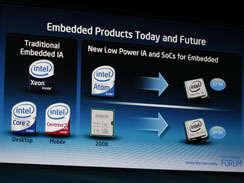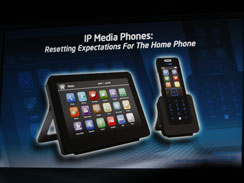
Pat Gelsinger told attendees of his keynote that the next evolution of the Internet is embedded and he predicts there will be more than 15 billion connected devices by 2015.
Gelsinger described it as a process that would “put the more into Moore’s Law,” and outlined new concepts and architectures required to create the fourth wave of the Internet.
Intel believes the embedded Internet device market could be worth more than $10 billion by 2011, and so there’s understandably quite a big push behind the idea.
This concept goes well beyond the idea of Mobile Internet Devices and Netbooks – things like Internet-enabled security, video intelligence, medical, home automation and automobiles were some of the examples cited during the keynote. Gelsinger believes that all of these examples will “greatly benefit” from the always connected mantra that Intel is outlining here.
He showed an Internet-enabled motorcycle, along with a prototype BMW convertible that came complete with WiMAX video streaming, GPS systems hooked up to the Encyclopaedia Britannica to enable virtual tour guides and other multimedia ideas, including weather and traffic information.
Safety seems to be secondary at the moment, because all of these gizmos are cool – I’m not sure I agree. Things like real-time weather and traffic information could be incredibly useful, but I’d rather have something a little less visual—and potentially distracting—in front of me when I’m driving around.
More convincing ideas included an Internet-enabled security system that used voice and facial recognition to determine whether or not someone was allowed to open a door, and I see some big opportunities in the ‘home phone’ market too. Having phonebooks, takeaway menus and more stored in The Cloud would be fantastic.
Being able to access these from your home phone, mobile and personal computer would be incredibly powerful—and more importantly, useful—to me. I often find myself using my mobile for the convenience these days, even when using a landline phone would be cheaper, as I don’t remember anybody’s phone number – mainly because I don’t have to, thanks to that great thing called an electronic address book.
What do you think about having the Internet wherever you are? Tell us in the forums.
Gelsinger described it as a process that would “put the more into Moore’s Law,” and outlined new concepts and architectures required to create the fourth wave of the Internet.
Intel believes the embedded Internet device market could be worth more than $10 billion by 2011, and so there’s understandably quite a big push behind the idea.
This concept goes well beyond the idea of Mobile Internet Devices and Netbooks – things like Internet-enabled security, video intelligence, medical, home automation and automobiles were some of the examples cited during the keynote. Gelsinger believes that all of these examples will “greatly benefit” from the always connected mantra that Intel is outlining here.
He showed an Internet-enabled motorcycle, along with a prototype BMW convertible that came complete with WiMAX video streaming, GPS systems hooked up to the Encyclopaedia Britannica to enable virtual tour guides and other multimedia ideas, including weather and traffic information.
Safety seems to be secondary at the moment, because all of these gizmos are cool – I’m not sure I agree. Things like real-time weather and traffic information could be incredibly useful, but I’d rather have something a little less visual—and potentially distracting—in front of me when I’m driving around.
More convincing ideas included an Internet-enabled security system that used voice and facial recognition to determine whether or not someone was allowed to open a door, and I see some big opportunities in the ‘home phone’ market too. Having phonebooks, takeaway menus and more stored in The Cloud would be fantastic.
Being able to access these from your home phone, mobile and personal computer would be incredibly powerful—and more importantly, useful—to me. I often find myself using my mobile for the convenience these days, even when using a landline phone would be cheaper, as I don’t remember anybody’s phone number – mainly because I don’t have to, thanks to that great thing called an electronic address book.
What do you think about having the Internet wherever you are? Tell us in the forums.

MSI MPG Velox 100R Chassis Review
October 14 2021 | 15:04
















Want to comment? Please log in.